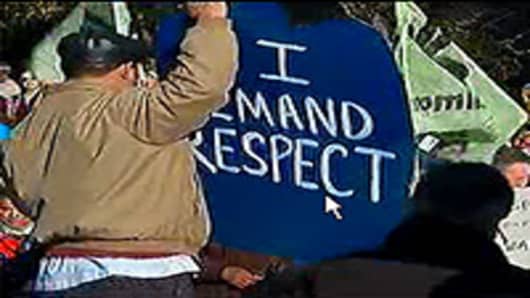The national obsession with shopping – which gave birth to the retail bonanza best known as Black Friday – may be in the process of victimizing itself with its own success.
Initial indications suggest that irresistible bargains are luring record numbers of U.S. shoppers into stores such as Macy's, Best Buy and Target.
Still, a backlash is widening over the encroachment of holiday sales on Thanksgiving. Amidst the obligatory swell crowds that come along with Black Friday, stressed out store workers are clamoring for relief from the stress of the holiday shopping season. Accordingly, some observer are becoming more leery about the spillover effects. (Read more:Black Friday Creep's Latest Victim: Restaurants.)
Each year, the steady creep of holiday discounting threatens to transform Black Friday into Black Thursday — and in some cases even earlier than that. Some stores have begun to use the week before Thanksgiving to lay the groundwork for the big Thanksgiving rush – the most important shopping day of the year for retailers.
"Consumers want value every day on the best brand-name designer products in the world," Tanger Factory Outlet Centers CEO Steve Tanger told CNBC on Friday, underscoring how for cost conscious buyers, just about every day was Black Friday.
He added that some of the stores at Tanger outlets had initiated retail stores at his outlets initiated sales during the Veterans Day weekend.
Yet each holiday shopping season appears to see a rise in clashes between ill tempered shoppers, push back from increasingly aggravated shop workers, and new strains on retailers themselves. (Read more: Don't Let Thanksgiving Become 'Black Thursday': Target Employees.)
Mindful of the relentless demand to offer cheap goods at early bird sales, Macy's EO Terry Lundgren expressed reluctance to open his stores earlier than 12 am on Black Friday.
"I think midnight's plenty [early] enough," Lundgren told CNBC in an interview — especially as the department store Mecca already bears the added burden of putting on the Thanksgiving Parade. Lundgren also addressed the strain early openings put on employees, many of whom want to spend time with family on one of the most sacred holidays on the U.S. calendar.
"After the parade our employees are home having Thanksgiving dinner with their families, and getting here at midnight is plenty enough to ask of them," Lundgren added. "So I'm satisfied we have the right strategy." (Read more: Black Thursday? Thanks, but No Thanks: Macy's CEO.)
For retailers, there are two major problems to consider in the rush to start sales progressively early.
First, analysts point out that steep discounting takes a toll on the bottom line of even the most cash flush merchants. As Brian Nagel, senior equity research analyst from Oppenheimer, pointed out, retailers are sacrificing store traffic for margins. As they struggle to outdo themselves and one another on sales, companies are in fact eroding their own profitability – even as they seek ways to build brand loyalty among consumers.
Meanwhile, the strains are beginning to show on store attendants, the foot soldiers in the retail wars. As Black Friday got underway, Wal-Mart was forced to contend with a labor protest that threatened both walkouts and protests. The impact, however, appeared limited as the day wore on.
All of which suggests that consumers may eventually cool on the endless drama of holiday sales. That could be a boost for Internet sales, independent of the "Cyber Monday" online sales that have captured public attention in recent years. (Read more: Cyber Monday May Set Record as US Goes on Buying Binge.)
At least for now, retail experts say online sales are less of a substitute for bricks and mortar shopping than a compliment. Yet evidence suggests that consumers are warming to the idea of replacing their computer screens for unruly throngs of shoppers.
IBM's Benchmark service, a metric that covers some of the 500 largest online sellers in the U.S., said on Friday that this year's Black Friday sales were up 13.1 percent versus a year ago. The firm noted a big jump in purchases using mobile devices – a key front in the battle between technology firms that sell both smartphones and tablets.
"If you look at what retailers are doing, they're combining their online with the stores," said Dana Telsey of the Telsey Group. "Stores are going to get smaller, so they'll have an edited selection, while online sites will have the full assortment."


